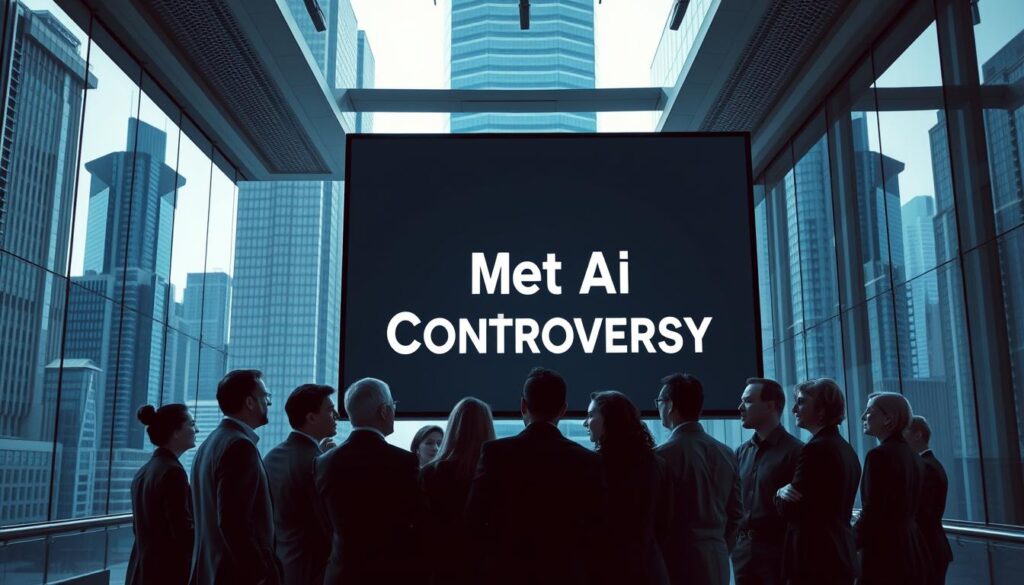
Have you heard about the recent controversy with Meta’s AI training? It involves the use of pirated books. This has led to a big debate on AI ethics. People are questioning if it’s right to use stolen content for AI models.
This scandal could affect the publishing world and Meta a lot. You might be thinking about how this will change AI and copyright use in the future.
The Meta scandal shows how crucial it is to use data ethically in AI. You’ll learn about the dangers of using stolen content for AI. This is a big issue.
Key Takeaways
- Meta’s use of pirated books for AI training exposed has sparked a controversy about AI ethics
- The Meta scandal may have significant implications for the publishing industry
- Meta’s actions could impact the future of AI development and the use of copyrighted material
- The use of pirated content to train AI models raises important questions about data ethics
- Meta’s AI controversy highlights the need for transparency in AI development
- The scandal may lead to changes in the way AI models are trained and developed
Introduction to Meta’s Controversy
Exploring artificial intelligence means understanding the importance of ethical data use. A recent controversy with Meta has brought up big questions about Piracy in AI training data and its effects on publishing. The main issue is whether tech giants like Meta can violate ethics and copyright laws.
AI training uses lots of data to teach machines. But, using pirated content raises big concerns about who owns the data. This is a big problem for the publishing world, as authors and publishers could lose a lot.
Overview of the AI Training Process
The AI training process includes several steps:
- Data collection: Gathering lots of data from books, articles, and online content.
- Data processing: Cleaning and sorting the data for training.
- Model training: Using the data to teach machines to make decisions.
Importance of Ethical Data Use
Using data ethically is key in AI development. It makes sure the tech is fair and respects intellectual property. Meta ethics violation and Meta copyright infringement can lead to legal trouble and harm the company’s image.
Implications for the Publishing Industry
The effects of Piracy in AI training data and Meta copyright infringement are huge. They impact authors, publishers, and the whole publishing world. It’s vital to tackle these issues and promote ethical data use for a fair future.
What Are Pirated Books?
Pirated books are copyrighted materials copied, shared, or sold without permission. This includes physical and digital formats. The Meta artificial intelligence scandal has shed light on Meta book piracy exposed. It shows why authors and publishers must guard their work.
Definition and Examples of Piracy
Piracy can happen in many ways. It includes scanning books, sharing digital copies, or selling fake books. For instance, sharing a scanned book online without permission is piracy.
The Impact of Piracy on Authors
Piracy hurts authors financially and emotionally. It means lost sales and income. For those who depend on book sales, this is a big problem. It also makes it hard for authors to control their work and protect their ideas.
Legal Consequences of Using Pirated Material
Using pirated material can lead to legal trouble. Those caught can face fines, lawsuits, and harm to their reputation. The Meta artificial intelligence scandal might lead to legal issues for Meta because of pirated books used in AI training.
- Piracy is a big problem for authors, publishers, and the whole publishing world.
- The Meta book piracy exposed scandal shows we need to be more aware and act to stop piracy.
- Authors and publishers must protect their work to prevent piracy.
Meta’s AI Training Practices
Exploring artificial intelligence, it’s key to grasp Meta’s training methods. The company uses a lot of text data in its AI development. This includes copyrighted material to enhance language skills and generation.
The use of pirated books in training has sparked worries about Meta data privacy breach. It also concerns the publishing world. Meta says it uses these books to make its AI models better. But authors and publishers see it as a copyright issue.
Here are some important points about Meta’s AI training:
- Use of copyrighted material: Meta’s AI systems are trained on copyrighted material, including books and articles.
- Role of pirated books: Pirated books are used to supplement the training data and improve the accuracy of Meta’s AI models.
- Justification: Meta justifies the use of pirated books by arguing that it helps to improve the diversity and accuracy of its AI models.
Understanding Meta’s AI training is vital, as it affects the publishing world. When thinking about Meta’s use of pirated books for AI training exposed, consider both sides. It’s important to look at other ways to develop AI.
The Exposure of Meta’s Practices
The recent Meta scandal has shed light on the company’s AI training methods. It shows they used pirated books in their AI controversy. This has big implications for the publishing world.
Details of the Investigation
The probe into Meta’s practices uncovered a complex data collection and usage. The company used a lot of text data to train their AI. This has sparked a Meta AI controversy over using copyrighted material without permission.

Key Findings from the Report
The report found several important points, including:
- The use of pirated books in AI training
- The lack of transparency in data collection and usage
- The potential consequences for the publishing industry
These findings are crucial for Meta and the tech world. They bring up big questions about data ethics and copyrighted material use.
Responses from Meta
Meta has spoken out about the investigation. They acknowledged the concerns about their AI training. The company says they will be more open and work with publishers to fix the Meta scandal issues.
Reactions from the Industry
The controversy over Meta’s use of pirated books in AI training data has caused a stir. As we look at Piracy in AI training data, it’s key to see what authors, publishers, legal experts, and AI ethicists think.
Many authors and publishers worry about the impact of Meta ethics violation on their work. They fear it could hurt their income and the value of their creations.
Authors and Publishers Weigh In
Some authors are angry about their work being used without permission. Others want more openness and responsibility in AI making. Publishers are worried about how this could affect their business and the need for better copyright laws.
Opinions from Legal Experts
Legal experts say Meta ethics violation could lead to legal trouble and rules changes. They stress that companies like Meta must use data ethically and get the right permissions for AI training.
Reactions from AI Ethicists
AI ethicists also have strong views. They point out the need for honesty and responsibility in AI creation. They see the use of Piracy in AI training data as a sign of a bigger issue – ignoring ethics for tech progress.
The debate shows the industry is at a turning point. The use of pirated data in AI training has big implications for AI and publishing. It’s crucial to listen to all sides and find a way that values ethics and respects intellectual property.
| Stakeholder | Perspective |
|---|---|
| Authors | Concerned about loss of revenue and intellectual property value |
| Publishers | Concerned about impact on business models and need for effective copyright protection |
| Legal Experts | Emphasize potential for lawsuits and regulatory challenges |
| AI Ethicists | Highlight need for transparency and accountability in AI development |
The Ethical Implications of Using Pirated Content
The recent Meta artificial intelligence scandal has shed light on the use of pirated content in AI training. The scandal involving Meta book piracy shows the importance of ethics in tech. Using pirated content means stealing from creators, raising big questions about ownership and copyright.
Using pirated content in AI development is morally wrong for tech companies. They must think about the consequences and be open about their AI work. This way, they can avoid being part of the Meta artificial intelligence scandal.
Ownership and Copyright Issues
Using pirated content can lead to serious copyright infringement. This can cause big financial losses for the original creators. It’s important to respect the rights of authors and creators, not to be part of the Meta book piracy scandal.
Moral Considerations for Tech Companies
Tech companies have a moral duty to act ethically in AI development. They should use only legitimate and licensed content, not pirated material.
The Need for Transparency in AI Development
Transparency is key in AI development, even more so when using content. Tech companies must be clear about their methods. This way, they can avoid being part of the Meta artificial intelligence scandal or the Meta book piracy scandal. By focusing on ethics and transparency, tech companies can help make the AI industry better and more responsible.
Potential Legal Ramifications for Meta
Meta’s use of pirated books for AI training has come to light. This could lead to serious legal issues. The company might face fines and lawsuits due to a data privacy breach.
Meta could face many legal problems. Anticipated lawsuits from authors and publishers could cost a lot. Also, regulators might look closer at how Meta collects and uses data.
Regulatory Challenges
Regulators might check Meta’s actions. This could make the company change how it does business. They might have to follow stricter rules about data and be more open about it.
Long-term Effects
This scandal could change Meta’s future. The company might rethink how it trains AI and collects data. It will need to focus more on ethics and respect for creators.
In conclusion, Meta’s legal troubles are a big worry. The company must focus on ethics and creator rights. This is to protect its reputation and financial health.
| Potential Consequences | Impact on Meta |
|---|---|
| Anticipated Lawsuits | Financial losses, damage to reputation |
| Regulatory Challenges | Changes in business model, increased scrutiny |
| Long-term Effects | Re-evaluation of AI training and data collection practices |
Comparisons to Other Tech Companies
When we talk about the Meta scandal and AI controversy, it’s key to see how others handle data ethics. Companies like Google and Microsoft have strong rules for AI data. They focus on being open and following copyright laws.
Google’s AI ethics principles aim for responsible AI. They stress privacy and being clear about data use. The Meta scandal shows we need tighter rules and standards for AI data.

Different tech companies have different views on data ethics. Some are more open and follow copyright rules better than others. Here’s a quick look at some differences:
| Company | Data Ethics Approach |
|---|---|
| Robust guidelines, emphasis on transparency and copyright compliance | |
| Microsoft | Established principles for responsible AI development, including respect for privacy |
| Meta | Involved in the Meta scandal, highlighting the need for stricter regulations |
Looking at how other tech companies handle data ethics helps us understand the Meta scandal’s impact. It shows us what the whole tech industry needs to do better.
Alternatives to Using Pirated Content
Piracy in AI training data is a big problem. We need to find better ways to use data. Open access resources are a good start. They offer lots of data without any ethics issues.
Public domain works are another great option. These works can be used for free because their copyrights have expired. Using these works helps avoid Meta ethics problems. It also makes sure AI models are trained on legal, high-quality data.
Best Practices for Ethical Data Use
Using data ethically is key in AI development. Here’s how to do it right:
- Always tell where the data comes from
- Share details about how data is processed and stored
- Make sure data is kept safe and secure
By following these steps, developers can avoid piracy issues. This way, AI models are trained on legal, quality data. It also promotes honesty and responsibility in AI work.
Future of AI and Copyright Issues
The Meta artificial intelligence scandal and the Meta book piracy exposed incidents have shown us a lot. They highlight how complex and changing the field of AI and copyright law is. Expect big changes in how AI systems are trained and the rules for copyright.
Predicted Changes in Legislation
New laws and rules are on the way. They will deal with AI using copyrighted materials. Expect stricter rules for data use and harsher penalties for copyright breaches.
Evolving Standards for AI Training
The scandal has made it clear that using pirated content in AI training is a big problem. We’ll see a move towards more honest and ethical AI development. This will mean using only licensed and open-source materials.
Innovations in Copyright Compliance
New tech, like AI-powered copyright detection tools, will be key in following copyright laws. We’ll see new tech and ways to track and manage copyrighted stuff. This will help companies avoid problems like the Meta book piracy scandal.
| Category | Predicted Changes |
|---|---|
| Legislation | Stricter guidelines for data collection and usage |
| AI Training | Increased use of licensed and open-source materials |
| Copyright Compliance | Development of AI-powered copyright detection tools |
Community and Public Response
The scandal about Meta using pirated books for AI training has caused a big stir. Many people are worried about the privacy breach and its effects on tech. Grassroots movements against piracy are starting, with people using social media to show their anger and call for change.
One way to make a difference is by choosing companies that use data ethically and are transparent. By picking products and services wisely, we can push the industry towards better practices. Education and awareness are crucial, as we need to grasp the issues with Meta’s actions and the risks of privacy breaches.
Here are some ways to join the fight against piracy:
- Support groups that fight for copyright protection and ethical data use
- Share information about the issue on social media and other platforms
- Urge companies to be open and accountable in their AI training
Social media is a powerful tool for advocacy. Sites like Twitter and Facebook help spread the word and gather support. By posting articles, videos, and personal stories, we can draw attention to the problem and push for change. As the community reacts to the scandal, it’s vital to keep an eye on developments and adjust our actions.
| Organization | Mission | Actions |
|---|---|---|
| Electronic Frontier Foundation | Defend digital privacy and free speech | Advocacy, education, and litigation |
| Authors Guild | Support authors and promote literary culture | Advocacy, community-building, and professional development |
Conclusion
Meta’s use of pirated books to train AI has caused a big controversy. This issue has shown us how important it is to be open and fair in AI development. We need to make sure AI is used in a way that respects everyone’s rights.
Summary of Key Points
We’ve looked closely at Meta’s AI training methods and how they affect authors and publishers. This has led to a big discussion about AI’s future and copyright. Many experts are now talking about the right and wrong ways to use AI.
Final Thoughts on Ethical AI Practices
As technology keeps getting better, companies like Meta must focus on doing the right thing. They need to use data responsibly and respect people’s work. This way, AI can help us create and innovate, not just take from others.
Call to Action for Responsible Tech Development
You can help make a difference by speaking out for fair AI practices. Support creators who fight against piracy. Also, push companies like Meta to follow strict ethical rules. Together, we can make sure AI helps us all, not just a few.
FAQ
What are pirated books?
How does Meta use pirated books for AI training?
What are the implications of Meta’s use of pirated books for the publishing industry?
What are the ethical concerns surrounding the use of pirated content for AI training?
What are the potential legal ramifications for Meta?
How do other tech companies handle data ethics for AI training?
What are some alternatives to using pirated content for AI training?
How can the public and the community respond to the Meta scandal?
RELATED POSTS
View all


